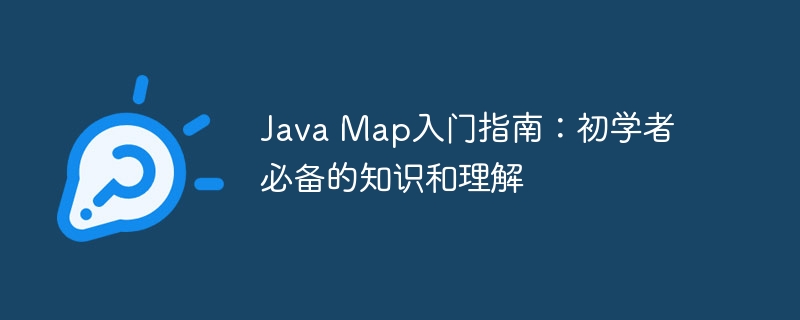Home >Java >javaTutorial >Getting Started with Java Map: Essential Knowledge and Understanding for Beginners
Getting Started with Java Map: Essential Knowledge and Understanding for Beginners
- 王林forward
- 2024-02-19 22:36:471068browse

- Map Overview
php editor Xiaoxin presents to you "Java Map Getting Started Guide: Essential Knowledge and Understanding for Beginners". In Java programming, Map is a very important data structure. It provides a storage method of key-value pairs and is suitable for various scenarios. This guide will provide an in-depth introduction to the basic concepts, common methods and usage techniques of Map, helping beginners quickly master the use of Map and understand key points. Whether you are a newbie or an experienced Java developer, this guide will provide you with valuable knowledge and guidance.
Map is widely used in Java. Whether it is web development, data storage or algorithm implementation, it can be seen everywhere. For example, in WEBdevelopment, Map can be used to store user session data; in data storage, Map can be used to store cached data; in algorithm implementation , Map can be used to implement hash tables or lookup tables.
- Common implementation of Map
In Java, there are several common implementations of Map, including HashMap, TreeMap and LinkedHashMap.
- HashMap: HashMap is the most common Map implementation in Java. It uses hash tables to store data and therefore has very fast lookup speeds. However, the keys and values of HashMap are unordered, which is not suitable for application scenarios that require access to data in a specific order.
- TreeMap: Inherited from NavigableMap interface. TreeMap is another common Map implementation in Java. It uses red-black trees to store data, so it has very fast lookup speeds. In addition, the keys and values of TreeMap are ordered, which is very suitable for application scenarios that need to access data in a specific order.
- LinkedHashMap: LinkedHashMap is a special Map implementation in Java. It inherits from HashMap, but it maintains a two-way linked list to store data. Therefore, LinkedHashMap has both the fast search speed of HashMap and the feature of accessing data in insertion order.
- Common operations of Map
Map provides a series of common operations, including put, get, remove, containsKey, containsValue, etc. These operations allow us to easily insert data into the Map, obtain data, delete data, and check whether the data exists.
- put: The put method is used to insert data into the Map. It accepts two parameters: key and value. If the key already exists in the Map, the put method will overwrite the value corresponding to the key.
- get: The get method is used to get data from the Map. It accepts one parameter: key. If the key exists in the Map, the get method will return the value corresponding to the key. If the key does not exist in the Map, the get method will return null.
- remove: The remove method is used to delete data from the Map. It accepts one parameter: key. If the key exists in the Map, the remove method will delete the value corresponding to the key and return true. If the key does not exist in the Map, the remove method will return false.
- containsKey: The containsKey method is used to check whether the Map contains a certain key. It accepts one parameter: key. If the key exists in the Map, the containsKey method will return true. If the key does not exist in the Map, the containsKey method will return false.
- containsValue: The containsValue method is used to check whether the Map contains a certain value. It accepts one parameter: value. If the value exists in the Map, the containsValue method returns true. If the value does not exist in the Map, the containsValue method will return false.
- Map application scenarios
Map has a wide range of application scenarios, including the following aspects:
- Web Development: In Web development, Map can be used to store user session data, form data, etc.
- Data storage: In data storage, Map can be used to store cache data, temporary data, etc.
- Algorithm implementation: In algorithm implementation, Map can be used to implement hash tables or lookup tables.
- Others: Map can also be used to implement object pools, configuration files, etc.
- Summarize
Java Map is a very important data structure that can help us easily store and manage key-value pair data. Map has a wide range of application scenarios. Whether it is web development, data storage or algorithm implementation, it can be seen everywhere. This article introduces all aspects of Java Map in detail, including common implementations of Map, common operations of Map, and Map application scenarios. I hope you can have a deeper understanding of Java Map through this article.
Demo code:
// 创建一个HashMap
Map<String, Integer> map = new HashMap<>();
// 向Map中插入数据
map.put("apple", 10);
map.put("banana", 20);
map.put("cherry", 30);
// 从Map中获取数据
Integer appleCount = map.get("apple");
Integer bananaCount = map.get("banana");
Integer cherryCount = map.get("cherry");
// 检查Map中是否包含某个键
boolean hasApple = map.containsKey("apple");
boolean hasOrange = map.containsKey("orange");
// 检查Map中是否包含某个值
boolean has10 = map.containsValue(10);
boolean has40 = map.containsValue(40);
// 删除Map中的数据
map.remove("cherry");
// 遍历Map
for (Map.Entry<String, Integer> entry : map.entrySet()) {
String key = entry.geTKEy();
Integer value = entry.getValue();
System.out.println("Key: " + key + ", Value: " + value);
}The above is the detailed content of Getting Started with Java Map: Essential Knowledge and Understanding for Beginners. For more information, please follow other related articles on the PHP Chinese website!

